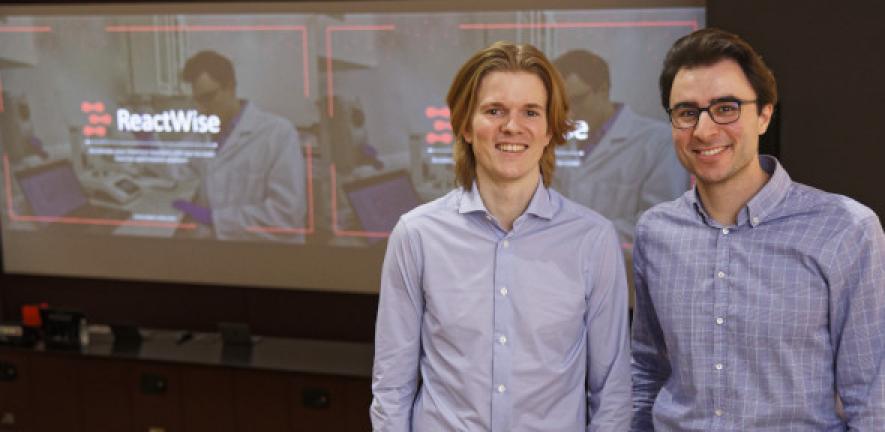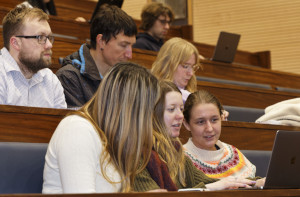
The new company, ReactWise, will provide software which enables organic chemists to efficiently select experiments, thus reducing time and cost, and increasing sustainability.
From PhD to start-up
Daniel Wigh and Alexander Pomberger have just completed their PhDs within the SynTech CDT programme, which provides cross-disciplinary training to students for the next generation of molecule-making techniques.
During their PhDs, Daniel and Alexander conducted research on how machine learning can be applied to make chemical synthesis more efficient.
Daniel, whose background is in chemical engineering, was supervised by Professor Jonathan Goodman in this department and Professor Alexei Lapkin in the Department of Chemical Engineering and Biotechnology. He realised that the algorithms he was creating could often only be used by other programmers. “After several coffee chats, I learned that the chemists within our department weren’t using computational tools as much as they could,” he says. “So, there was a usability gap to provide access to our methods without the necessity to code.”
Alexander, who was supervised by Professor Alexei Lapkin and Professor Matthew Gaunt, says: “As a trained organic chemist I started in a typical wet lab setting and learned the standard workflows. It was only during my PhD that I understood that chemical reactions are often so multidimensional, that it poses a challenge to efficient human decision making. We could see the need for easy-to-use software that bridges the gap between machine learning and chemistry.”
Machine learning improves outcomes
Alexander and Daniel have written several papers on data-driven chemical reaction optimisation during their PhDs. “The current state-of-the-art explores how data from prior campaigns can be incorporated into future campaigns with techniques such as multi-task Bayesian optimisation. In one of our papers, we demonstrated an up to 30x speed-up using this strategy over full-factorial screening” explains Daniel.
Alexander says: “Since this strategy performed so well, it is the optimization approach which we will provide for our case studies. To use our software, you just need to upload your prior data, define your input variables and objectives, and machine learning models will be trained behind the scenes to provide a recommendation for the next experiments to do.”
Putting the software to use
For example, a user could define an optimisation campaign where the input parameters include solvents, bases, a temperature range, and a time range, with the objective of maximising the yield. The software would then suggest an initial set of experiments, and after the user completes these experiments and adds this data, the models will be updated, and a new set of experiments suggested. This cycle is typically repeated for a few iterations, until the user’s goals are met.
“Multi-objective optimisation can be particularly challenging without a data-driven strategy,” explains Daniel. “Designing sustainable chemical processes is important for our future, and with an algorithmic approach, the trade-offs between multiple objectives, such as yield, sustainability score, and purity, can be better understood.”
Feedback from industry
Daniel and Alexander have also been working with the Innovation Centre in Digital Molecular Technologies (iDMT) based in the Department of Chemistry. The iDMT offers a platform for the rapid development and testing of new products and services for the emerging digital economy, specifically in the chemical synthesis of molecules and materials.
“The iDMT is the perfect environment. They work with small and medium sized companies, but also with large pharmaceutical companies with the goal of translating academic research results into industrial solutions,” says Alexander.
“We could see there was a need, but does that mean there’s a market? So, we’ve also been talking to industrial partners and got very promising feedback. It’s quite exciting to see interest from industry in the strategies we developed in our PhD,” says Daniel.
 Daniel and Alexander are continuing to develop and test their product. “We ran a workshop for the chemistry department and a number of people contacted us afterwards to express interest in running a case study together,” says Daniel proudly. “We’ve now had had about 40 people do trial runs of our software, and we are just about to start our first case studies in a wet lab setting.”
Daniel and Alexander are continuing to develop and test their product. “We ran a workshop for the chemistry department and a number of people contacted us afterwards to express interest in running a case study together,” says Daniel proudly. “We’ve now had had about 40 people do trial runs of our software, and we are just about to start our first case studies in a wet lab setting.”
“It’s great to see that the training our SynTech CDT provides has enabled two students to work together and develop this exciting future commercial opportunity,” said Matt Gaunt, who is the Yusuf Hamied 1702 Professor of Chemistry in this department.
Above: Students trialling the ReactWise software platform at a workshop.


